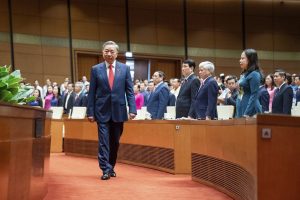2024 has been very kind to To Lam, Vietnam’s minister of public security. He started the year as a candidate in a hotly contested field seeking to become the next general secretary of the Communist Party of Vietnam (CPV), alongside Prime Minister Pham Minh Chinh, President Vo Van Thuong, Chairman of the National Assembly Vuong Dinh Hue, and Truong Thi Mai, the head of the CPV’s Central Organization Commission. So far, President Thuong, Chairman Hue and Chairwoman Mai have all been forced to resign due to allegations of corruption and misconduct. With the field dramatically reduced, the CPV Central Committee chose earlier this month to nominate Lam as Vietnam’s next president, one of the four most senior positions in the country, which was confirmed by the National Assembly on May 22.
This promotion may not be the boon it seems, however. Lam’s position as minister of public security has been an ideal perch from which to target his rivals while avoiding getting singed by the “blazing furnace” anti-corruption campaign. Whereas getting caught on video being fed gold-encrusted steak by celebrity chef Salt Bae might be a career-ending scandal for a less secure official, in To Lam’s case, the only people to face legal repercussions were those who mocked his extravagance. The presidency, by contrast, is a largely ceremonial position lacking significant powers that To Lam could use to build influence and defend his position. As president, To Lam’s influence will be dependent on the power wielded by people within his larger patronage network, and especially the network of supporters he has built up in the Ministry of Public Security (MPS).
To Lam’s success in rooting out corruption at the highest levels of the party-state made his appointment to the presidency more or less an inevitability, according to Carl Thayer, professor emeritus at the University of New South Wales. With Mai stepping down last Thursday, the only other eligible candidates for the post were Prime Minister Pham Minh Chinh, who is in the middle of developing the country’s next five-year plan, and the octogenarian CPV General Secretary Nguyen Phu Trong. “The only person left was To Lam,” said Thayer.
It’s quite possible that To Lam could maintain much of his existing power over the MPS as president. After all, his predecessor as minister – former President Tran Dai Quang – was able to exercise a substantial amount of control over MPS from the presidency until he died in 2018. But for To Lam, doing so will be dependent on whether he can ensure the promotion of one of his loyalists as the next minister of public security, a position that has been vacated since Lam’s promotion. If he fails to do so, his career could be in jeopardy. To Lam has made no shortage of enemies over the course of the ongoing anti-corruption campaign.
“The opposition to him is coming from the provincial authorities because he’s bowled into various provinces and found people guilty and ripped the weeds and left destruction,” said Thayer. “He’s getting rid of corrupt officials, but that’s upsetting everybody’s bailiwick.”
If a rival can take over MPS, there is little To Lam would be able to do as president to prevent them from expunging his network of supporters.
Despite the risks, ascending to the presidency comes with its own upsides. Thayer noted it was an excellent opportunity for him to soften the hardline image he has developed over his time as the head of the MPS.
“He now has to meet and greet heads of state, so every day he’s going to get wonderful publicity in the local press,” he said.
Ultimately, whether To Lam’s appointment to the presidency is a boon or a curse will come down to whether he can maintain his influence without access to direct control over the MPS. “The presidency makes To Lam number two in the party and a strong contender [to become CPV general secretary] to the next Congress, but moving away from his power base could be a risk for him,” said Nguyen Khac Giang, a visiting fellow at the ISEAS-Yusof Ishak Institute. “Two years is a long time in Vietnamese politics.”
































